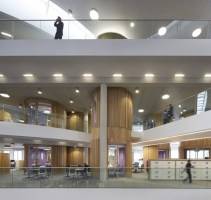October 9, 2014
BCO announces winners of national awards for Britain’s best workplaces
 The BCO has announced the winners of its prestigious annual National Awards to honour what it considers Britain’s best workplaces. The overall winner was Number One Riverside in Rochdale (above). The office, home to Rochdale Metropolitan Borough Council, was also recognised as the Best Corporate Workplace in the UK, and topped a list of six other award winners recognised for excellence in office space. Number One Riverside was singled out by the judges for its consolidation of the Council’s estate from 33 buildings into one. The project is also the centrepiece for the first phase of a major regeneration in the borough of Rochdale, ‘providing a new civic office that promotes new ways of working and creates a sense of community, engagement and social transparency.’ The building was commended by the judges for its incorporation of a range of public space alongside the workplace, including a library and cafe and customer service facilities.
The BCO has announced the winners of its prestigious annual National Awards to honour what it considers Britain’s best workplaces. The overall winner was Number One Riverside in Rochdale (above). The office, home to Rochdale Metropolitan Borough Council, was also recognised as the Best Corporate Workplace in the UK, and topped a list of six other award winners recognised for excellence in office space. Number One Riverside was singled out by the judges for its consolidation of the Council’s estate from 33 buildings into one. The project is also the centrepiece for the first phase of a major regeneration in the borough of Rochdale, ‘providing a new civic office that promotes new ways of working and creates a sense of community, engagement and social transparency.’ The building was commended by the judges for its incorporation of a range of public space alongside the workplace, including a library and cafe and customer service facilities.











 There is now an unstoppable energy for radical change in the way that companies of all sizes conduct their Corporate Social Responsibility duties. There are compelling economic and social reasons for companies to construct new ways of thinking and practice around CSR that go way beyond just doing something worthy or nice, from building effective partnerships to attracting top employees. Some companies prefer terms like ‘corporate responsibility’, ‘corporate conscience’, ‘corporate citizenship’, ‘social performance’, ‘sustainability’ or even ‘future-proofing’ over CSR. But the core CSR principles are that a business voluntarily commits to embracing responsibility for its actions and to impacting positively on the environment, on society and on consumers, employees and other stakeholders.
There is now an unstoppable energy for radical change in the way that companies of all sizes conduct their Corporate Social Responsibility duties. There are compelling economic and social reasons for companies to construct new ways of thinking and practice around CSR that go way beyond just doing something worthy or nice, from building effective partnerships to attracting top employees. Some companies prefer terms like ‘corporate responsibility’, ‘corporate conscience’, ‘corporate citizenship’, ‘social performance’, ‘sustainability’ or even ‘future-proofing’ over CSR. But the core CSR principles are that a business voluntarily commits to embracing responsibility for its actions and to impacting positively on the environment, on society and on consumers, employees and other stakeholders. 








July 24, 2014
The collaboration between BIFM and CIPD unites the workplace tribes
by James Sutton • Comment, Facilities management, Workplace
(more…)